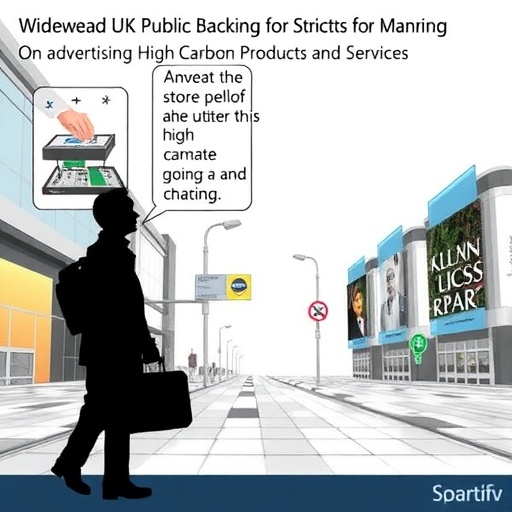A sweeping new study conducted in the United Kingdom reveals compelling public endorsement for imposing stricter regulations on advertisements promoting high-carbon products and services. This research, combining extensive public polling with a deliberative citizens’ jury, exposes a burgeoning consensus among UK citizens for policy interventions aimed at curbing the influence of marketing strategies that favor environmentally detrimental consumption. The findings mark a significant moment in climate policy discourse, suggesting that societal appetite for regulatory measures is growing in parallel with the climate crisis itself.
The study employs a novel mixed-methods approach, integrating quantitative survey data with qualitative insights from a citizens’ jury comprised of a diverse group of residents. This hybrid methodology enables a comprehensive assessment of public sentiment, unearthing not only the prevalence of support but also the depth of reasoning behind it. Participants were exposed to detailed information on the carbon emissions associated with various goods and services, prompting reflective deliberations on the societal and environmental implications of advertising practices.
Ads for high-carbon products, such as fossil-fuel powered vehicles, air travel, meat-heavy diets, and energy-intensive appliances, are ubiquitous and have a substantial impact on consumer behavior. The researchers highlight the role of advertising in normalizing consumption patterns that contribute disproportionately to greenhouse gas emissions. By regulating such advertisements, policymakers could reduce the social license for carbon-intensive lifestyles, potentially triggering shifts in market demand towards more sustainable alternatives.
One of the key revelations from the citizens’ jury was the recognition of advertising’s psychological power in shaping desires and choices, often fostering unsustainable consumption by creating aspirational imagery linked to products with heavy environmental footprints. Jurors expressed concerns about the asymmetry between public health campaigns, which often discourage harmful behaviors, and the lack of comparable restrictions on advertisements fueling ecological harm. This dissonance underscores a perceived need for the regulatory landscape to evolve in alignment with environmental imperatives.
Public polling mirrored the jury’s conclusions, with a substantial majority of respondents endorsing the idea that governments should intervene to restrict advertisements that promote high-carbon goods and services. Support was notably strong across age groups, socio-economic statuses, and political affiliations, indicating a broad-based consensus rather than a polarized viewpoint. This widespread backing challenges assumptions that climate action policies lack popular mandate and suggests fertile ground for policy innovation.
The study also engaged with ethical considerations surrounding freedom of speech and commercial rights, balancing these against the urgency of climate mitigation. The deliberations revealed nuanced public perspectives recognizing the limits of advertising freedoms when they contribute to public harm, drawing analogies to existing regulations on tobacco and alcohol advertising. This analogy strengthens the legitimacy of regulatory proposals in the eyes of citizens.
Researchers emphasize that advertising restrictions should be viewed not as a panacea but as part of a comprehensive suite of climate policies. They advocate for synergistic strategies including carbon pricing, investment in green technology, and public education campaigns. By aligning advertising regulation with broader sustainability goals, governments can signal the seriousness of their climate commitments and mobilize societal engagement.
Technically, the implementation of advertising restrictions would require clear definitions and guidelines regarding what constitutes a “high-carbon” product or service, necessitating collaboration with climate scientists, economists, and industry stakeholders. Enforcement mechanisms would have to be transparent and robust to prevent loopholes. Digital platforms, which serve as major advertising conduits today, represent a particular focus given their reach and influence.
The rising public support demonstrated in this study sets a political landscape conducive to experimentation with regulatory frameworks that have been applied selectively in other domains but rarely in relation to climate impacts. Countries watching the UK’s policy trajectory might find lessons in the social feasibility and design principles showcased in this research. The UK’s example could catalyze a global shift in how advertising is leveraged in climate strategy.
From a scientific communication standpoint, these findings underscore the potential for public engagement and deliberative democracy to shape sustainable policy innovation. Including citizens directly in the conversation provides legitimacy and grounds policies in the lived values and concerns of people, enhancing democratic responsiveness amidst urgent environmental crises.
In conclusion, this pioneering UK study offers critical evidence that public opinion is ready for more assertive regulation of advertising related to high-carbon products, bridging the gap between climate science urgency and societal willingness for transformative change. This alignment between evidence, public will, and policy potential marks an important step forward on the path to climate resilience and sustainability.
Subject of Research: Public attitudes towards regulation of advertising for high-carbon products and services in the UK.
Article Title: Is there a public mandate for restricting advertising of high-carbon products and services?: Citizens’ jury and public polling evidence from the UK
News Publication Date: 24-Sep-2025
Web References: http://dx.doi.org/10.1371/journal.pclm.0000599
Image Credits: Jacob Ainscough, CC-BY 4.0 (https://mediasvc.eurekalert.org/Api/v1/Multimedia/5cf61261-a82d-48d6-959a-11adcb754d07/Rendition/low-res/Content/Public)
Keywords: climate policy, advertising regulation, high-carbon products, public opinion, citizens’ jury, sustainable consumption, environmental impact, UK climate action




